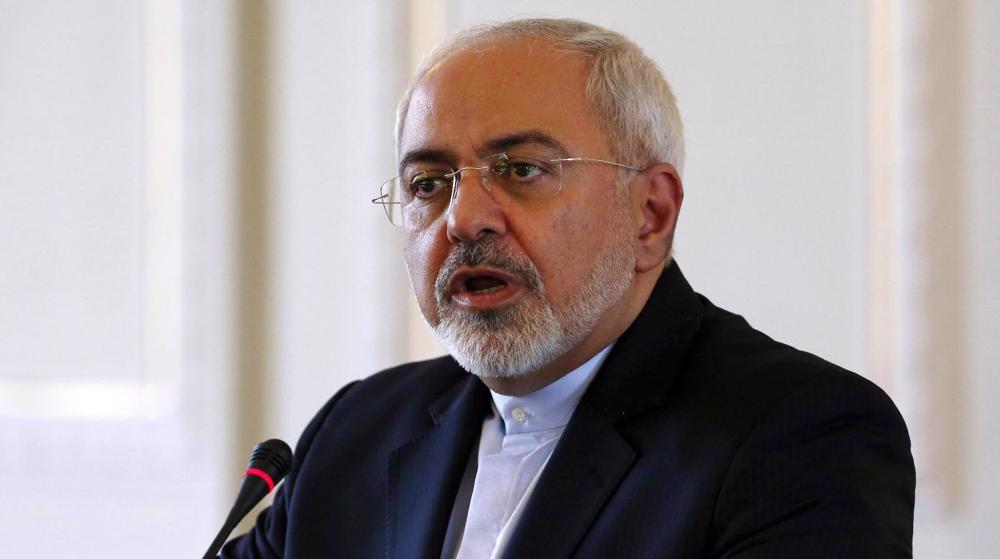EU responsible for ‘sequencing’ all parties’ compliance with JCPOA: Iran FM
Iran’s foreign minister says the European Union is responsible for taking action to ‘sequence’ compliance of all parties to Iran nuclear deal in a bid to end the current standoff between Tehran and Washington over which party should take the first step and return to its commitments under the accord.
Mohammad Javad Zarif’s remarks came in an exclusive interview with Japan’s Kyodo news agency, whose text was published on Monday.
Under his signature ‘maximum pressure’ policy against Iran, former US President Donald Trump walked out of the 2015 multilateral nuclear agreement -- officially known as the Joint Comprehensive Plan of Action (JCPOA) -- signed between Iran and six major powers in May 2018. He restored those economic sanctions the agreement had removed. The US also began threatening third countries with “secondary sanctions” if they violated the American bans.
Joe Biden, the current president of the United States, censured Trump’s withdrawal from the JCPOA during his 2020 campaign. He promised to rejoin the accord, which was signed when Biden was vice president, but has failed to take corrective measures since he assumed office on January 20 and has conditioned a return to the deal on Tehran’s resumption of full compliance with the agreement.
Iran says a potential return of the United States could only be meaningful if Washington removed all of the sanctions.
President Hassan Rouhani said earlier this month that no party should expect Iran to take the first step towards reviving the nuclear deal, adding that the buck stops with the country that has abandoned the agreement.
“Today, no one can expect Iran to take the first step. I think there is no doubt who should start. We have not exited the deal so that we would want to take the first step now,” he said.
Elsewhere in his interview, the Iranian foreign minister said the European Union’s foreign policy chief, Joseph Borrell, is in a good position as head of the JCPOA Joint Commission to coordinate steps that must be taken by all parties to the deal to return to their commitments as a prelude to end the current faceoff between Tehran and Washington.
"Mr. Borrell can specify the time frame in consultation with Iran and the United States. It is clear the United States has to take steps first," Zarif said.
He emphasized that it is Borrell's responsibility to sequence a restoration of compliance with the nuclear accord by Washington and Tehran.
"When Washington takes its steps, and we see the outcome, we can immediately take (steps) ourselves, and it is up to Borrell to choreograph these steps," he said.
Zarif, however, ruled out direct negotiations with the Biden administration to that end and emphasized that the deal cannot be renegotiated.
He warned that the window of opportunity to resolve the impasse will soon close as February 21 is approaching, the day on which a new law passed by the Iranian Parliament requires the country’s administration to stop voluntary implementation of the Additional Protocol to the Non-Proliferation Treaty (NPT) unless Washington lifts unilateral sanctions it re-imposed on Tehran after leaving the accord.
"A law has been passed by Parliament. That law has to be implemented," he said, emphasizing that Biden's team should make a decision soon whether to return to the JCPOA or continue Trump's legacy by not quickly lifting sanctions.
The top Iranian diplomat said the country would produce more enriched uranium and further promote its nuclear development if the window closes.
Describing Japan as an old friend of Iran, which also maintains good relations with the United States, Zarif added, "We expect Japan to act as a friend, particularly when it comes to international law.
"Since the United States is violating international law, the best role that Japan can play is to show Americans that Japan will not implement their illegal decisions," he said.
Japan should unfreeze Iranian assets: Zarif
Zarif further called on Japan to unblock Iranian assets frozen in Japanese banks due to US sanctions.
According to Zarif, Iran's frozen assets in Japan and South Korea amount to nearly $10 billion.
He said the unfrozen funds can be used to procure medicines and food, including vaccines for the COVID-19.
Read more:
Turkey's foreign minister meets Syria's de facto leader in Damascus
'Next to impossible' to rescue patients from Gaza's Kamal Adwan Hospital: Director
VIDEO | Vietnam current prosperity
Report blames gasoil exports for shortage at Iranian power plants
VIDEO | Hind Rajab Foundation names Israeli war criminals vacationing after Gaza genocide
VIDEO | Australians rally for Gaza ahead of Christmas festivities
VIDEO | Attacks on Sana'a
Iran reports further drop in annual inflation rate in December













 This makes it easy to access the Press TV website
This makes it easy to access the Press TV website